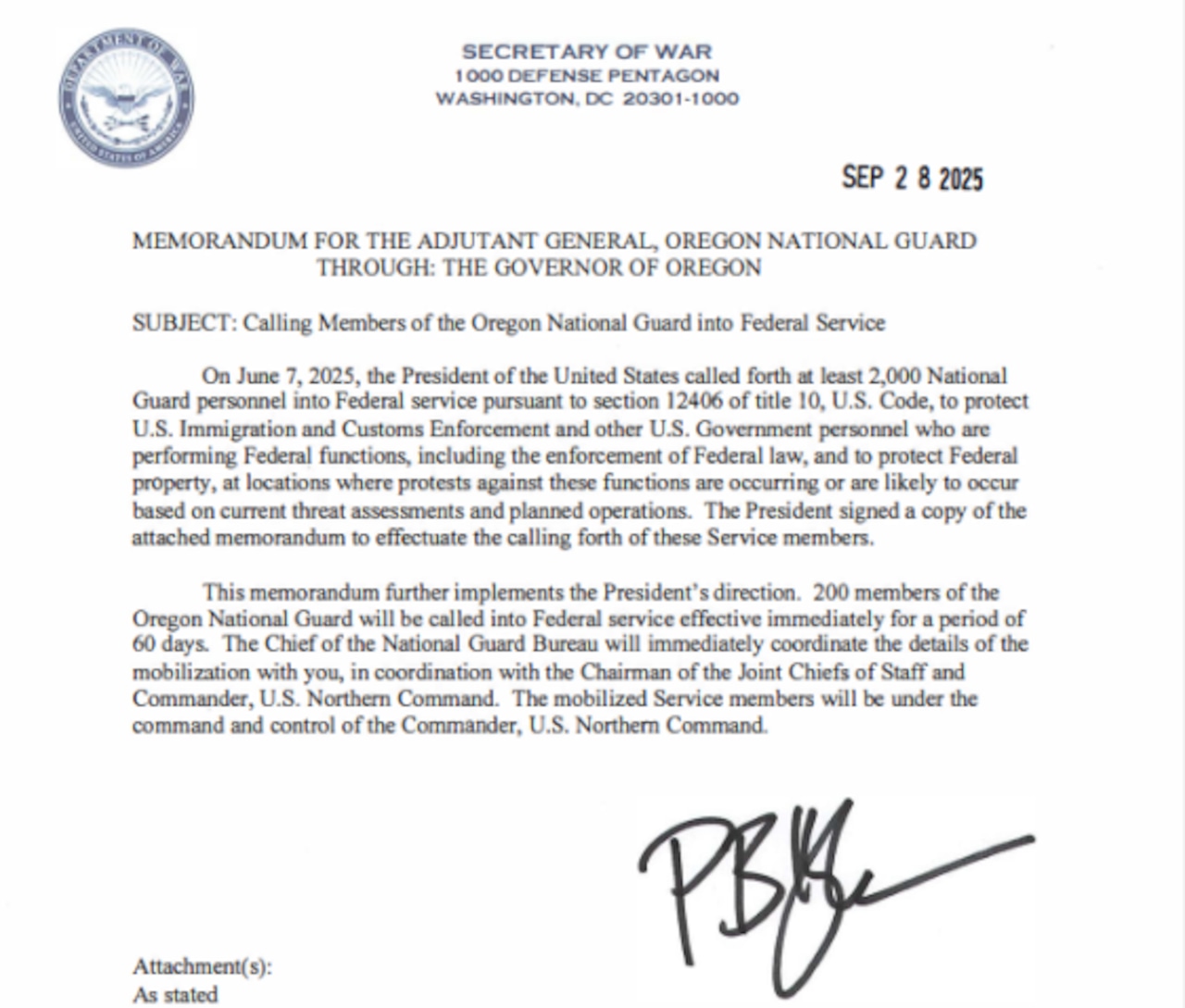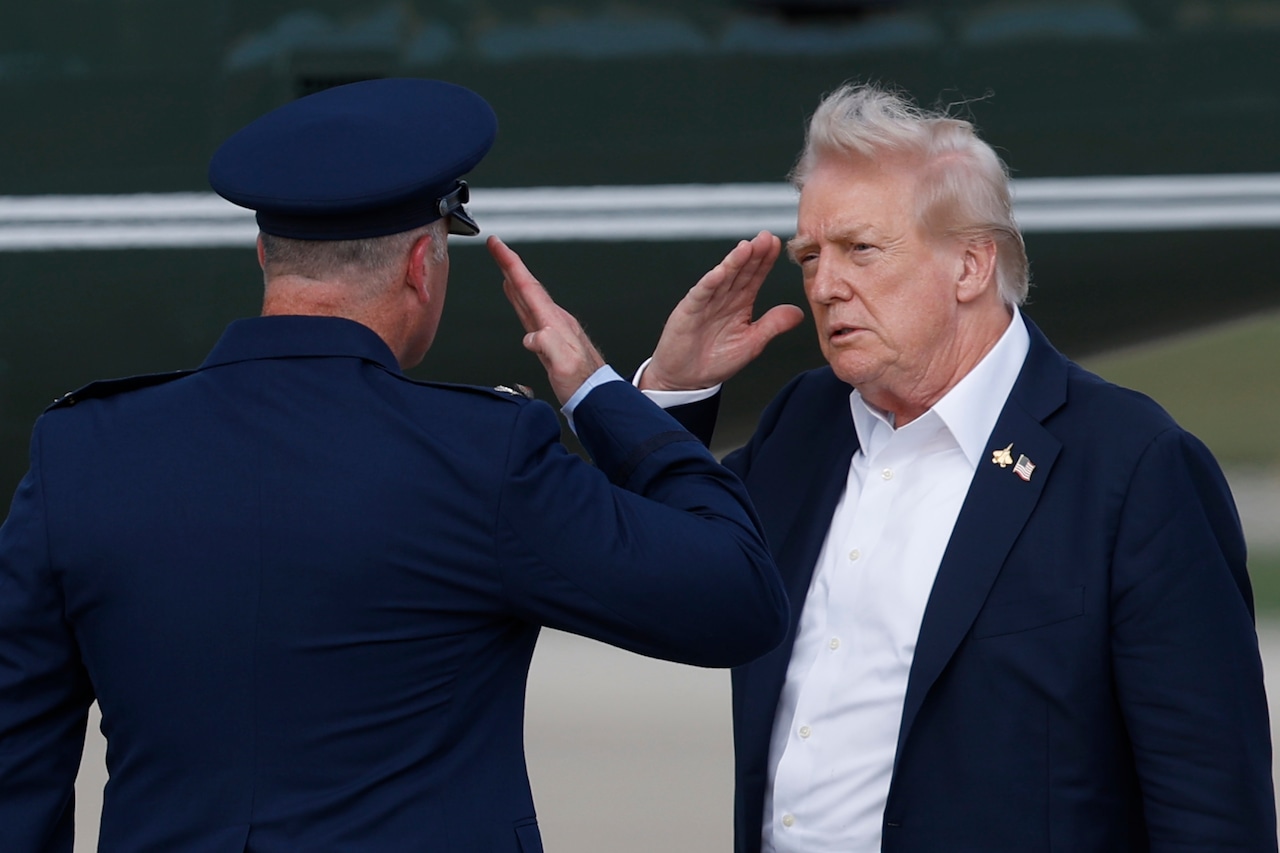Oregon’s Attorney General Dan Rayfield announced Sunday that the state has filed a lawsuit to block President Donald Trump from deploying the National Guard to Portland, a day after Trump authorized federal troops to protect what he dubbed “War ravaged Portland.”
Gov. Tina Kotek had received notice by email at 9:32 a.m. Sunday from the U.S. Department of Defense that Trump had invoked a section of federal law to call 200 members of the Oregon National Guard into federal service in the city of Portland for 60 days, under the U.S. Northern Command.
Rayfield, appearing with Kotek and Portland Mayor Keith Wilson during a virtual news conference, decried any attempt to send military troops to an Oregon city, calling it an infringement of state and local sovereignty and a violation of federal law as the suit was filed.
“The facts cannot justify this overreach,” says the 41-page suit filed by the State of Oregon and City of Portland against Trump.
It notes that protests outside the Immigration and Customs Enforcement facility in Portland have been small in recent weeks, typically drawing less than 30 people.
“Defendants’ heavy-handed deployment of troops threatens to escalate tensions and stokes new unrest,” the suit says.
Filed in federal court in Portland, it marks the latest legal challenge to Trump’s move to send troops into cities and asks a judge to bar Trump from any deployment of troops to Oregon.
 The three leaders held a virtual news conference Sunday afternoon to announce the lawsuit filed by the state of Oregon and city of Portland against President Donald Trump.Screenshot
The three leaders held a virtual news conference Sunday afternoon to announce the lawsuit filed by the state of Oregon and city of Portland against President Donald Trump.Screenshot
“I am no longer in charge of the members (of the Oregon National Guard) that he will be calling up,” Kotek said.
She said she had no idea when troops the president planned to send to Portland would arrive or what they would be doing. “I don’t have any details,” she said.
The memo Kotek received said the chief of the National Guard Bureau will coordinate details of the mobilization with the Oregon National Guard’s adjutant general, along with the chair of the Joint Chiefs of Staff and commander of the U.S. Northern Command.
 Gov. Tina Kotek received this memo at 9:32 a.m. on Sunday, informing her that President Donald Trump had invoked a section of federal law to deploy 200 Oregon National Guard members into federal service.Governor’s Office
Gov. Tina Kotek received this memo at 9:32 a.m. on Sunday, informing her that President Donald Trump had invoked a section of federal law to deploy 200 Oregon National Guard members into federal service.Governor’s Office
Trump has moved to federalize National Guard troops under federal law, known as Title 10, Section 12406. That says the president can call up the National Guard in federal service when the president is unable with regular forces to “execute the laws of the United States,” repel an invasion by a foreign nation or suppress a rebellion or the danger of a rebellion against the authority of the U.S. government.
Such orders, the code says, shall be issued through the “governors of the States,” or in the case of the District of Columbia, through the commanding general of its National Guard.
Rayfield’s office moved to file the suit as soon as possible and will be filing a temporary restraining order within the next 24 hours to try to block an arrival of troops. He said he hopes to get a hearing before a judge later this week.
“In America, we don’t use our United States military on our own citizens, except in extreme circumstances,” Rayfield said.
Kotek called it a “sad day for Oregon,” saying she was disturbed that the Trump administration was not listening to the people of the state.
The governor said she shared her strong objections with Trump during a seven-minute phone call on Saturday after waking up to his social media post. She then heard from an assistant of the president by text message that Trump was concerned about activities outside Portland’s ICE building but she said she thought she’d have an opportunity to follow up with him on Sunday.
“This is not necessary. It is unlawful and it will make Oregonians less safe,” she said.
 President Donald Trump, right, salutes Air Force Col. Christopher M. Robinson, Commander, 89th Airlift Wing, before boarding Marine One upon his arrival at Joint Base Andrews, Md., on Friday.AP Photo/Luis M. Alvarez
President Donald Trump, right, salutes Air Force Col. Christopher M. Robinson, Commander, 89th Airlift Wing, before boarding Marine One upon his arrival at Joint Base Andrews, Md., on Friday.AP Photo/Luis M. Alvarez
The suit alleges that Trump’s actions violate the 10th Amendment’s guarantee that police power — including ensuring safety at protests and deterring violence crimes — “resides with the states, not the federal government.”
The presence of National Guard troops will create “confusion among the public,” threaten to undermine the work local police are doing to maintain order and combat crime and harm businesses and tourism in Portland, it said.
The Portland Police Bureau is fully equipped to address the sporadic protests outside the ICE building, the suit said. Its Central Precinct has been monitoring the nightly protests outside the ICE building and has the ability to send additional officers from other precincts, call in its Rapid Reaction Team of officers to deal with crowd control or rely on its county and state police partners if needed, according to the suit.
“The unlawful deployment of federalized National Guard troops to usurp that law enforcement role will directly interfere with the ability of state and local law enforcement to deal with any given situation,” the suit said.
Earlier this month, the District of Columbia’s attorney general filed a suit to try to halt the federal government’s deployment of National Guard to the district’s streets.
In California, a federal judge granted an injunction declaring the action of federal troops in Los Angeles “an unlawful encroachment on state and local authority.” The 9th U.S. Circuit Court of Appeals has put a temporary hold, or stay, on the injunction as it considers the government’s appeal. City attorneys from Portland and Beaverton joined about 30 other cities in a friend-of-the-court brief filed last Monday in support of California’s challenge and Breyer’s injunction.
Kotek said the Oregon National Guard members are Oregon citizens who are “trained for real emergencies,” including wildfire suppression and are now being called into a “mission without a clear goal.”
“I don’t need them in Portland,” she said. “When there is no basis for this, it is incomprehensible. It is very concerning for our country.”
But the governor made it clear that she wants the public to respect the members of the Oregon National Guard, noting they are “citizen soldiers, who are our neighbors and our friends.”
“I will use everything in my authority to support them as Oregonians, and I will have their back,” she said.
Mayors from other cities across Oregon are anticipated to join with Mayor Wilson at Portland City Hall on Monday in support of the city’s challenge of Trump’s troop deployment, Wilson said. Wilson called the president’s actions a “big show of force,” and said he and other mayors will be “pushing back at this overreach.”
“It would be an understatement to say that I am so disappointed at the irresponsibility of our federal government,” Wilson said. “We don’t need troops on our soil in Portland. Portland is not an enemy.”
As Oregon’s governor and attorney general turned to the court to try to intervene, the American Civil Liberties Union of Oregon, the Urban League of Portland, a statewide union and other local groups galvanized for an afternoon rally and march on the city’s waterfront, distributing fliers that read, “No Federal Forces in Portland!”
On Sept. 2, U.S. District Judge Charles R. Breyer of San Francisco issued an injunction barring the federal government’s use of the National Guard in California to make arrests or engage in searches, security patrols, crowd control, evidence collection, interrogations or work as informants.
Breyer said his order did not bar the government from using the troops in ways that are consistent with federal law, such as protecting federal property. His injunction was limited to California.
In that case, Breyer’s noted Congress in 1878 passed the Posse Comitatus Act, which prohibited the use of the military for domestic purposes. It bars military forces from direct “involvement in the execution of laws” or actions that “pervade the activities of civilian authorities.”
Congress acted then to prevent the federal government from deploying troops to the South to police polling places.
The Trump administration argues that a “constitutional” exception to the Posse Comitatus Act gives the president authority to protect federal property, employees and federal functions, pointing to the federal code, Section 12406.
Breyer rejected the Trump administration’s argument. While some people engaged in violence in the Los Angeles protests, “there was no rebellion, nor was civilian law enforcement” unable to respond to the protests and enforce the law, the judge wrote.
The Trump administration refused to coordinate with state and local officials and had military troops execute functions that the federal law bars the military from performing, the judge wrote.
If you purchase a product or register for an account through a link on our site, we may receive compensation. By using this site, you consent to our User Agreement and agree that your clicks, interactions, and personal information may be collected, recorded, and/or stored by us and social media and other third-party partners in accordance with our Privacy Policy.
